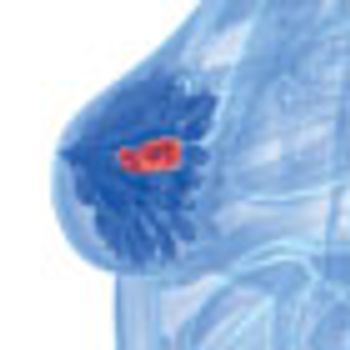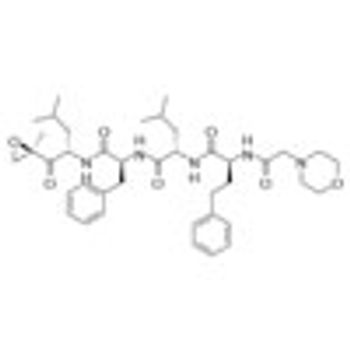
The FDA has expanded the approval for enzalutamide to include the treatment of men with chemotherapy-naive metastatic castration-resistant prostate cancer.

Your AI-Trained Oncology Knowledge Connection!


Silas is the senior vice president, content, at MJH Life Sciences. He began his career at MJH in 2011 as a Web Editor on OncLive. From this role, he moved into managing the social media across the organization and then into broader roles across the content department, first taking on management of HCPLive.
Throughout his tenure at MJH, Silas has been accountable for several organic launches of highly successful brands, including Targeted Oncology and NeurologyLive, and for quickly transforming acquisitions into high-functioning business units. Follow him on X @SilasInman, LinkedIn, sinman@mjhlifesciences.com.

The FDA has expanded the approval for enzalutamide to include the treatment of men with chemotherapy-naive metastatic castration-resistant prostate cancer.

The FDA has approved pembrolizumab (Keytruda) as a treatment for patients with advanced or unresectable melanoma who are no longer responding to other drugs, making it the first PD-1 inhibitor to gain approval in the United States.

Gastric cancer is comprised of 4 distinct molecular subtypes of disease, each representing a unique opportunity for new drug development, according to a paper published in Nature by The Cancer Genome Atlas (TCGA).

The FDA has assigned a priority review designation to lanreotide (Somatuline Depot) as a treatment for patients with gastroenteropancreatic (GEP) neuroendocrine tumors (NETs)

The combination of multiple independent factors minimized the impact of baseline stage for predicting locoregional recurrence (LRR) following neoadjuvant chemotherapy in patients with breast cancer, according to a large retrospective analysis presented in advance of the 2014 Breast Cancer Symposium.

Cabozantinib (Cometriq) failed to significantly extend overall survival compared with prednisone as a treatment for men with metastatic castration-resistant prostate cancer.

Eisai has submitted a New Drug Application for lenvatinib (E7080) as a treatment for patients with progressive, radioactive iodine (RAI)-refractory differentiated thyroid cancer (DTC), based on findings from the phase III SELECT trial that was presented at the 2014 ASCO Annual Meeting.

Treatment with KTE-C19, a CD19-targeted CAR-modified T cell therapy, demonstrated an objective response rate of 92% in patients with advanced B-cell malignancies.

The FDA has approved eltrombopag as a treatment for patients with severe aplastic anemia following an insufficient response to immunosuppressive therapy.

A number of large pharmaceutical companies have forged clinical trial collaborations focused on the investigation of novel combinations and companion diagnostics across multiple cancer indications.

The addition of lenalidomide to R-CHOP demonstrated promising efficacy in previously untreated patients with diffuse large B-cell lymphoma across all subtypes of the disease.

Pfizer has submitted a New Drug Application for palbociclib plus letrozole as a frontline treatment for postmenopausal women with ER-positive, HER2-negative advanced breast cancer, based on findings from the phase II PALOMA-1 trial.

The FDA has approved bevacizumab in combination with paclitaxel and cisplatin or paclitaxel and topotecan as a treatment for patients with persistent, recurrent, or metastatic cervical cancer.

Treatment with single-agent carfilzomib (Kyprolis) was unable to significantly extend overall survival (OS) compared with best supportive care in heavily pretreated patients with multiple myeloma

The FDA has approved the noninvasive stool-based DNA test Cologuard for the detection of colorectal cancer or cancer precursors in asymptomatic patients at average risk.

The FDA has expanded the bortezomib (Velcade) label to allow for retreatment in patients with multiple myeloma who previously responded to the proteasome inhibitor, according to an announcement made by Millennium/Takeda, the companies that manufacture the drug.

Women harboring a loss-of-function mutation in the PALB2 gene demonstrated an increased risk of developing breast cancer that was similar to the predisposition seen with mutations in the infamous BRCA gene

The FDA has assigned a priority review designation to the JAK1/2 inhibitor ruxolitinib as treatment for patients with polycythemia vera who are resistant or intolerant to hydroxyurea

The combination of carfilzomib (Kyprolis), lenalidomide (Revlimid), and low-dose dexamethasone extended progression-free survival (PFS) by 8.7 months compared with lenalidomide and dexamethasone alone for patients with relapsed multiple myeloma

New generations of potent ALK inhibitors have been designed with extensive CNS activity and the ability to overcome acquired resistance mutations.

Third generation EGFR TKIs have demonstrated dramatic benefits for patients with non-small cell lung cancer (NSCLC) and should be considered as a standard second-line option following resistance to frontline therapy

Curative strategies for patients with advanced lung cancer remain elusive despite several exciting advancements, according to Paul A. Bunn Jr, MD, and Primo N. Lara Jr, MD, who delivered keynote lectures during the 15th Annual International Lung Cancer Congress.

The FDA has expanded the approval of ibrutinib to include the treatment of patients with chronic lymphocytic leukemia who have received at least one previous therapy and harbor a 17p deletion.

The FDA has approved idelalisib in combination with rituximab for patients with high-risk relapsed or refractory CLL and as a single-agent for two types of iNHL.

Extended adjuvant treatment with neratinib (PB272, HKI-272) significantly extended improved disease-free survival (DFS) compared with placebo for patients with HER2-positive breast cancer who received prior adjuvant trastuzumab

The FDA has assigned a priority review designation to bevacizumab (Avastin) in combination with chemotherapy for patients with recurrent platinum-resistant ovarian cancer.

The combination of the immunotherapy CRS-207 and the vaccine GVAX Pancreas has received a breakthrough therapy designation from the FDA for its potential as a treatment for patients with metastatic pancreatic cancer.

A phase III study comparing trametinib (Mekinist) plus dabrafenib (Tafinlar) with single-agent vemurafenib (Zelboraf) has been stopped early following a positive interim analysis

The somatostatin analog lanreotide (Somatuline Depot) significantly prolonged progression-free survival (PFS) compared with placebo for patients with metastatic gastroenteropancreatic neuroendocrine tumors.

The treatment landscape for patients with non-small cell lung cancer (NSCLC) is poised to undergo dramatic changes, as novel immunotherapies, second-generation targeted therapies, and new maintenance strategies continue to show promise in clinical trials.